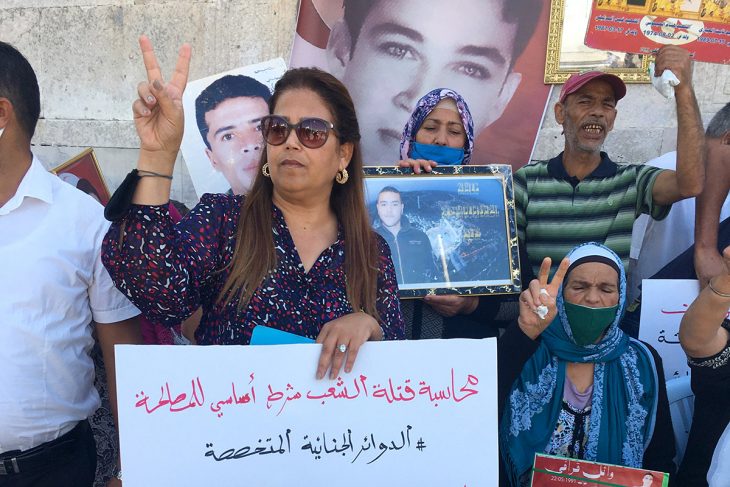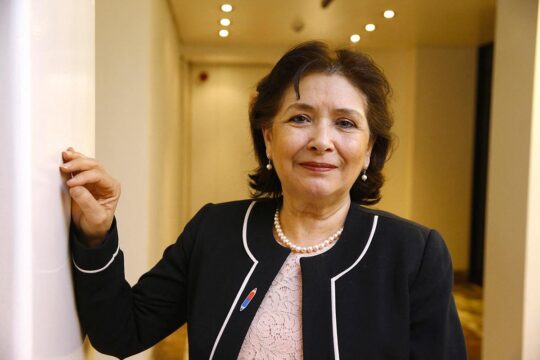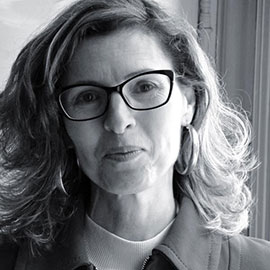It’s Friday, September 18 in Tunis. On Kasbah Square, seat of the Tunisian government and favourite spot for social and political demonstrations since the 2011 revolution, the Awfiya (Faithful) association is holding a protest sit-in. Squeezed between the entrance to the Aziza Othmana Hospital and the road separating them from the government’s fenced-off compound, some 50 people have been gathered since 9 AM. Led by lawyer Lamia Farhani, sister of the "martyr" Anis Farhani who was shot and killed at age 20 by a police officer on January 13, 2011, Awfiya has come to defend the rights of the "heroes of the revolution" and their families.
Through an old loudspeaker that carries her voice badly, the Awfiya president evokes the continuing grief, expectations and frustrations of the demonstrators around her. Elderly men and women, mostly from the regions, carry the portraits of their missing. The slogans and placards they carry call for publication of the final list of the wounded and "martyrs" of the revolution, which ten years after the events of winter 2011 is still being passed around authorities and commissions. The cries and protests of the dictatorship’s victims have been resounding in Tunisia for the past decade, but their anxiety this morning is at its height.
An issue forgotten by the new government
Until the beginning of July, significant progress had been made by the previous government of Elyes Fakhfakh: publication in the Official Journal on June 24 of the Truth and Dignity Commission (IVD) report; establishment of a commission to design the government's plan for implementing the IVD report’s recommendations; creation on July 7 of a commission to manage the Dignity Fund for reparation and rehabilitation of victims; and the start of consultation on a final list of the wounded and "martyrs".
But since the installation on 1 September of the Samir Mechichi government to replace Fakhfakh’s administration, which resigned following a conflict of interest case, no action has been taken on transitional justice nor on the victims of the revolution issue. In his inaugural address to parliament on 31 August, the new head of the executive, a technocrat, made no mention of transitional justice. Magistrate Thouraya Jeribi, the new minister in charge of relations with constitutional bodies and civil society, could have inherited the transitional justice post in this ministry, replacing transitional justice proponent Ayachi Hammami. But this did not happen. The two commissions created by the previous government - one to implement the IVD recommendations and the other to activate the victims' fund - have come to a standstill for lack of competent officials.
Victims feel abandoned once again. And for the past two weeks, various associations of survivors of serious human rights violations have been protesting in the Kasbah. "No reconciliation without judgments," they insisted during their sit-in.
Anti-transitional justice populism
On Saturday September 19 in front of the government palace, at least 400 people came to listen to Abir Moussi, president of the Parti destourien libre (PDL), a political party grouping some of former President Ben Ali’s political staff and supporters and founded in 2013 by his former Prime Minister, Hamed Karoui. Moussi is a lawyer, she is in her 40s like Lamia Farhani. But everything separates these two women in black dresses. Passionaria of the Ben Ali system, populist and denialist of the revolution according to her detractors, Moussi was elected to the Assembly of People's Representatives (ARP – Tunisian parliament) in autumn 2019.
Since then, her popularity - due to her talents as an orator, her ability to capitalize on party disappointments and her declared hatred of Islamists - has continued to win votes and support in the polls. Before that, Moussi had already distinguished herself by her ruthless criticism of the IVD, its work, its president and the very idea of reparation for victims.
With a security detail that would make the most reputed leaders of historical parties jealous, Moussi addresses a public that is already convinced: bourgeois and modern-looking couples over 40 with masks and Tunisian flags; many women in jeans and sunglasses. Her security agents are vigilant: "Mrs. Abir does not want her supporters photographed," we are told. The audience seems to love the succession of "revelations" about what she says this government is hiding on "laundering of terrorism, its financiers and ideologues”. One of the banners reads: "The People want police rule back”.
Less than a week later, on Friday September 25, Moussi submitted to the ARP a draft amendment to the law on transitional justice to, as the party's communiqué stated, "put an end to the political manipulation of this issue and the exclusion of relevant expertise, in addition to double standards". This proposal clearly seeks to limit or do away with transitional justice.
Moussi is counting on the new political landscape to see through this project, which she had already announced in March 2017. At the time, she had no seat in parliament. Today, political groups and personalities are courting her to talk about reconciliation - such as the Kalb Tounes (Heart of Tunisia) party of Nabil Karoui - or amnesty for the Ben Ali family, a proposal from the Islamist Lotfi Zeitoun in a Facebook post on 19 September, date of the first anniversary of the dictator's death.
Former Ben Ali advisers
But this project is also part of a burning issue that opposes the two heads of the executive, President of the Republic Kaïs Saïed and Mechichi. On September 20, the new head of government wanted to appoint two economic advisors who were among Ben Ali's former close collaborators, Taoufik Baccar and Mongi Safra. Baccar was Minister of Finance in the 1990s, before heading the Central Bank until the revolution. Safra served for many years as economic advisor to the deposed president. He is considered the architect of financial arrangements for the Ben Ali clan. He is implicated in a case revealed by the National Commission of Investigation into Corruption and Embezzlement set up in 2011. Between 2008 and 2009, to satisfy Ben Ali's desire to buy a new plane, Safra organized a sale of shares held by the airline Tunis Air to relatives of the president. The deal burdened the company with financial difficulties, as reported by news site Inkyfada. But Safra has seen this case amnestied under the law on reconciliation adopted by parliament in September 2017.
It is still the case, says Khayem Chamli of NGO Lawyers Without Borders, that "Mr. Safra is on the list of defendants in case No. 31 of the specialized chamber in Tunis, where he has appeared twice. We have the reports of the case. He is being prosecuted for embezzlement of public funds. We should remember that even though he’s one of the beneficiaries of the reconciliation law, transitional justice trials, according to Article 148 of the Constitution, do not allow any form of amnesty." According to the schedule of hearings, Safra will be recalled to the bar of the Tunis chamber in mid-December. Baccar's name is also mentioned in the indictment sent by the IVD to the specialized chamber in Tunis in case No. 31 on corruption involving Ben Ali, part of his family and several of his associates.
"Ending the exclusion of former regime expertise"
The two economic advisers’ appointment immediately provoked the ire of the President. Receiving Mechichi at the presidential palace on September 23rd, he expressed his hostility to this choice loud and clear in a video broadcast on the official page of the presidency: "There is no question of these people coming back while their cases are still before the courts," the angry president thundered at a stunned head of government. The next day the Prime Minister confided to private television channel Ettassia through one of his staff that the appointment was not yet confirmed.
It was in reaction to this position of President Saïed that Abir Moussi brought her legislative initiative " to end the exclusion of expertise from the former regime and the harassment and psychological torture of those involved in legal proceedings in the specialized chambers", according to a party press release. The PDL president knows that she is currently unable to get her bill adopted given Islamist deputies of Ennahdha who have a majority in Parliament. She also knows that President Saïed, known to be favourable to transitional justice, would not ratify it either. However, the lawyer is betting on the long term. All the polls say that she will win hands down in the next legislative elections, and she wants to make a mark for the future. Already, on social media thousands of fans are talking about her initiative, praising her strength of character, clear-sightedness and perspicacity.







